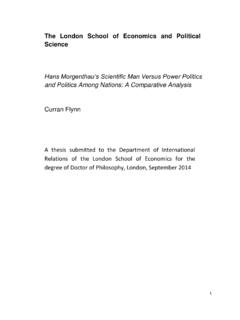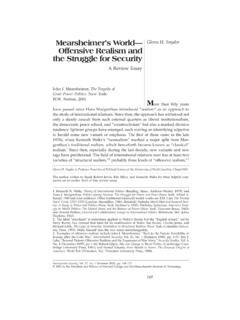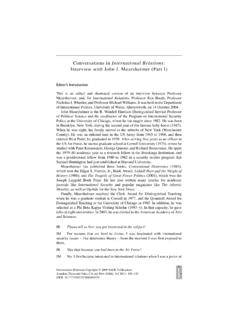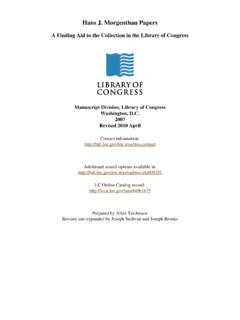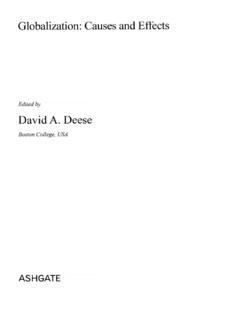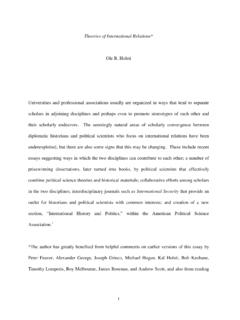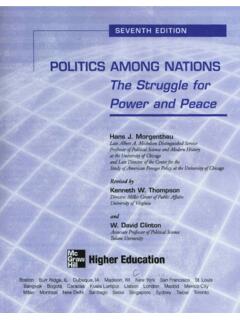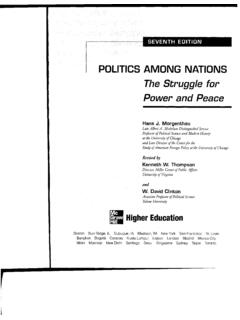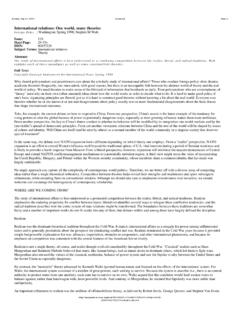Transcription of APPROACH TO INTERNATIONAL RELATIONS
1 933 Marmara niversitesi .. Dergisi YIL 2008, C LT XXV, SAYI 2 CRITICAL PERSPECTIVES ON HANS MORGENTHAU S APPROACH TO INTERNATIONAL RELATIONS Dr. Gary CHAMBERS Abstract Hans Morgenthau s contribution to the scholarship of INTERNATIONAL RELATIONS dominated the field at least until the 1970s. The aim of this article is to explore how Morgenthau s views on Realism have impacted on the subsequent study of INTERNATIONAL RELATIONS (IR), and to identify the salient aspects of the ongoing debate between Morgenthau and his many critics. Regardless of the explanatory power of Morgenthau s Realism, and its advantages of parsimony and clarity, Morgenthau s thinking has been convincingly challenged by a number of other incisive approaches. Even the most rigorous IR theory has finite explanatory power and cannot hope to provide a satisfactory account of every single aspect of INTERNATIONAL politics .
2 However, traditional Realists are perhaps too dedicated to the vision of an unpromising future for humanity. Key Words: INTERNATIONAL RELATIONS , Morgenthau, Realism, Alternative Approaches. HANS MORGENTHAU'NUN ULUSLAR ARASI L K LERE YAKLA IMI ZER NE ELE T REL BAKI A ILARI zet Hans Morgenthau nun Uluslar aras li kiler bilimine katk s 1970 lere kadar alanda st nl n s rd rm t r. Bu makalenin amac ; Morgenthau nun realizm zerine g r lerinin Uluslar aras li kiler(IR) alan nda daha sonraki al malarda nas l bir etki b rakt n ve Morgenthau ve ele tirenleri aras nda s regelen tart man n nemli y nlerini ortaya koymakt r. Morgenthau nun realizminin a klay c g c ne ve cimrili inin ve Marmara University, Ata rk Education Faculty, Dr. Gary CHAMBERS 934 a kl n n yararlar na bakmaks z n, Morgenthau nun d n ne, di er bir ok akla yatk n yakla m taraf ndan a k a meydan okundu.
3 Hatta en iyi Uluslar aras li kiler yakla m bile s n rl bir a klay c g ce sahiptir ve uluslar aras ili kiler politikas n n her bir y n ne yeterli l de de inmesi beklenilemez. Fakat gelenek i Realistler, belki de insanl k i in umutsuz bir gelecek oldu u g r ne kendilerini fazlaca kapt rm lard r. Anahtar Kelimeler: Uluslararas li kiler, Morgenthau, Realizm, Alternatif Yakla mlar Introduction Realism has arguably been the most prominent theoretical paradigm in INTERNATIONAL RELATIONS discourse since 1945. There can equally be little doubt that Hans Morgenthau s contribution to this body of scholarship singularly dominated the study of INTERNATIONAL RELATIONS until the 1970s. Morgenthau s particular concern in the 1940s and 1950s was to tame Americans' optimism that complex geopolitical conflicts could always be resolved by high-minded principle. Thus, Morgenthau's APPROACH stood in sharp contrast to the idealist theory of INTERNATIONAL RELATIONS , which had dominated the inter-war study of the field.
4 Idealism, an essentially normative APPROACH , had argued that the elimination of war and its replacement by reinvigourated INTERNATIONAL law (the principle of "peace through law") and improved diplomacy would create a better INTERNATIONAL order. One assumption of idealism was that human beings everywhere were linked by overriding common interests based on either morality or enlightened self-interest. Central to Morgenthau s thinking, however, lie the fundamental concepts of power and national interest. The aim of this article is to explore the way in which Morgenthau s views on Realism have impacted on the subsequent study of INTERNATIONAL RELATIONS (IR), and to identify the salient aspects of the ongoing debate between Morgenthau and his many critics. This article will attempt to demonstrate that fundamental questions of INTERNATIONAL RELATIONS have been rigorously dissected by a range of new critiques that contest fundamental aspects of Morgenthau s thinking.
5 1. The Realist Mindset The classical realists generally shared the basic assumption of a pessimistic view of human nature in which man is viewed as inherently self-interested and unchangeable. For realists, states are autonomous sovereign entities that develop their own independent, self-interested decisions in a constant struggle for scarce resources. Realists believe that anarchy in the INTERNATIONAL system limits the willingness of states to cooperate. It is rational for states to compete for power and security. Thus, Realism predictably emphasises the importance of military power. Hans J. Morgenthau (1904-1980) was a pioneer in post-world War Two theorizing about INTERNATIONAL RELATIONS and a powerful proponent of political realism. He was, as Henry Kissenger notes, ..the doyen of American philosophers of the national interest 1. Indeed, Morgenthau came to be viewed as the pope of IR (Griffiths 1992, p.)
6 36). 1 Henry Kissenger, Diplomacy, New York, Simon &Schuster,1994, 935 Morgenthau s first book Scientific Man Versus Power politics (1946), critiqued what he ..claims is the dominant liberal belief in progress, based on an optimistic set of assumptions regarding human 2. In politics among nations (1946), Hans Morgenthau attempted to outline a general theory of INTERNATIONAL politics that is conceived as interest defined in terms of power. Morgenthau argues that states are the key actors in world affairs. State interests are not constructed by the INTERNATIONAL system. States act as rational, self-interested, opportunistic individuals in pursuing national interests by the most efficient, available means. Indeed, states are so preoccupied with power and security that they must even be prepared to renege on INTERNATIONAL agreements if they are found to weaken a states vital interests.
7 Power is an end in itself. Morgenthau, insisted on the radical antinomy between Christian virtues and political action. He attributes much of the evil in politics to human nature and ..the animus dominandi, the desire for 3. There is, Morgenthau argues .. no escape from the evil of power, regardless of what one Political ethics is indeed the ethics of doing evil. While it condemns politics as the domain of evil par excellence, it must reconcile itself to the enduring presence of evil in all political "4. This does not mean that he was insistent on the detachment of morality from INTERNATIONAL politics rather that ..In order to be worthy of our lasting sympathy, a nation must pursue its interests for the sake of a transcendent purpose that gives meaning to the day-to-day operations of its foreign 5. For all realists, calculations about power are fundamental determinants in how states think about the world around them6.
8 Power is the primary consideration: morality, ideology, economics, and religious or other cultural factors are of far less importance as to how states may explain their actions. For Morgenthau, .. Power is the force that determines INTERNATIONAL political scenarios in the absence of divine truth, and is located among the representatives of a nation whose responsibility it is to oversee foreign 7. The ethics of INTERNATIONAL RELATIONS are purely situational and are very different from the strictures of private morality that may be held by individuals8. For Morgenthau, motives and personal virtue were not of any relevance in the underpinning of foreign policy. There can be no question of universal values: ..We judge and act as though we were at the center of the universe, as though what we see everybody must see, and as though what we want is legitimate in the eyes of justice.
9 Turning Kant s categorical imperative upside down, we take it for granted that the 2 Martin Griffiths, Hans Morgenthau , Fifty Key Thinkers in INTERNATIONAL RELATIONS , Florence, Routledge, 1999, 3 Hans Morgenthau, politics among nations : The Struggle for Power and Peace, New York, Knopf, 1946, 4 Morgenthau, , 5 Hans Morgenthau, The Purpose of American politics , New York, Knopf, 1960, 6 John J. Mearsheimer, The Tragedy of Great Power politics , New York, Norton & Company, 2001, 7 A. Heath, Re-examining Core Concepts of Classical Realism: Carr, Hans Morgenthau and the Realist agenda , paper presented to Sixth Pan-European INTERNATIONAL RELATIONS Conference, University of Turin, 12 -15 September, 2007, 8 Morgenthau, , Dr. Gary CHAMBERS 936 standards of judgment and action produced by the peculiarities of our perspective can serve as universal laws for all mankind Morgenthau.
10 Judged as blasphemous any claim that a given nation or leader was guided by Providence. Concrete results, not universal principles, were his test of a policy s 10. Morgenthau argued that the national and world arenas were based on the same processes and principles of power politics11. The ultimate skill of the state leader is to adapt to the changing power-political configurations in world politics . politics domestically and internationally is fundamentally concerned with the balancing of power. Morgenthau also argued that the balance of power would emerge almost as a natural phenomena . Morgenthau emphasised that ..all the successful statesmen of modern times from Richlieu to Churchill have made the national interest the ultimate standard of their policies, and none of the great moralists in INTERNATIONAL affairs has attained his 12. politics , ..has no limits-it lacks defined objects of interest or resources of power.


